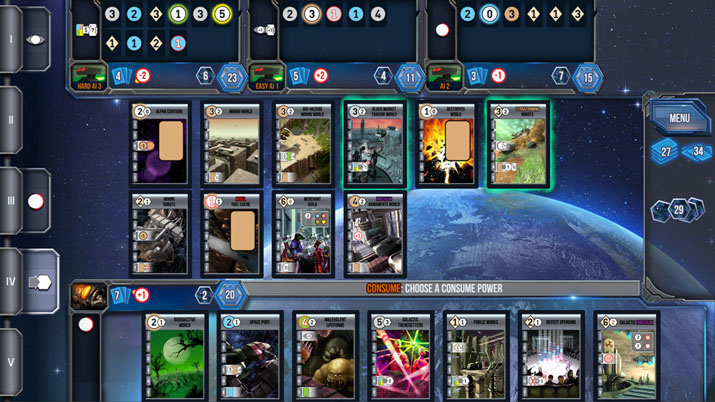Race for the Galaxy is the latest originally-real card game to get the digital treatment.
There are few major trends in gaming that are going as under-the-radar as the ongoing conversion of the conversion of board and card games into video games, as there are very few gamers (who aren’t already into games with origins in cardboard-and-paper) that are aware of these titles being re-released on the PC -- or even console or smartphone, for some lucky titles. Despite the obscurity, these converted titles represent a true booming niche in video gaming; it seems like every month a new, well-known title is digitized, and with the ease of setup and play, and the very attractive option to play these titles solo against AI (no need for those pesky “friend” things), it’s not surprising that this trend shows no signs of slowing down.

Enter Race for the Galaxy (RftG), the most recent popular card game (popular being a relative term in the super-saturated and still somewhat underground hardcore board/card game movement) to get a video game version. For those who know the lingo of the genre, RftG is a two-to-four player hand-management, economic-civilization builder with short matches (twenty minutes is a long game), simultaneous choices from players, and no combat. For the uninitiated, think of RftG as a quick simulation that pits space-based factions against each other as they attempt to found worlds, develop buildings and other properties, and produce and trade goods, all in order to try and play cards and make trades that earn your faction the most Victory Points. Most of this is done through playing cards from your hand by discarding other cards up to the played card’s cost (1-6), or by trading goods you’ve produced for their values. Play is all about balancing the addition of cards to your hand with founding worlds and building developments, and play happens in phases, with each player choosing a single phase each turn. Though all chosen phases are played by all players, the player who chose the specific phase gets a bonus that go-around [EN: follow suit].
As you might be able to tell, this is an inherently deep game, especially for how fast its rounds are. The original card game has been out for ten years now and it’s been popular enough to have five expansions, meaning its rules and gameplay are pretty heavily polished and it is super-established as a staple in the card gaming scene.
So then, in reviewing the video game version, there are really two major questions to be answered: Does RftG succeed in being a good digital version of a paper game, and is it something newcomers to the game will enjoy enough to try?

No Frills, But No Big Mistakes
As a conversion, RftG is not bad at all. That said, there’s nothing mind-blowing or all that exciting here, either: It’s a straightforward, no-nonsense port of the game into a digital format, and everything works as it’s supposed to. You’ve got the cards, you’ve got your phases, and, as of this writing, there are even two expansions (Gathering Storm and Rebel vs. Imperium) available to purchase for a few bucks each (you also get a mini-expansion free with New Worlds, which adds a few starter planets to your deck).
The creators here were probably attempting to appeal to those who are already a fan of the game by keeping the production elements simple, focusing on making it as fast and easy to play as possible, without any frills. This is both a good and bad thing, but probably more of a good thing in the long run. It’s not all that pretty, and it doesn’t have any added drama or flair, such as animations or a narrated tutorial or anything that a video game could have, but it works perfectly well and the no-frills presentation makes games go by incredibly fast.
So, Will Noobs Like it?
Speaking of those players who don’t have experience with the paper version, let’s talk about whether or not you should put the dollars down on RftG if you haven’t played before. I think the enjoyment to be had with RftG for new players will come down to a few things: Are you into other card games; are you into head-to-head games with deep mechanics and little in the way of visuals; and how much do you need the game to incentivize to keep playing?
If you don’t play a lot of card games, but you like games like Civilization, or really anything else that is rules-heavy and complex, you could do worse than trying this game out and seeing if the whole ‘card game thing’ is something you might get into. It’s a very good example of the genre, if not the flashiest or most popular (albeit still popular). That same depth and dynamism that I’ve mentioned make it a good intro card game, and if you can take the three or four quick games it takes to learn how to play well, I think any gamer that’s into complex games with highly structured rules that allow for lots of variation in strategy will find it worth the meager price to try this out.
In all though, this is a good, if not brilliant, digital remake of a popular card game. It’s not buggy or confusing, it’s got all the cards and it does all the hard work of setup and tracking the game state for you, and the game itself is just like the original, which is considered a well-made and established head-to-head economic card game. If you dig that kind of thing, you’ll dig this, and I think even those new to the game and the genre will like it if they like complex, fast strategy games.
The Verdict
Take a look at some gameplay online -- maybe even of the physical game -- and see if you like the pace and strategy. My suggestion for fans of the original card game, or card games in general: get this one. It’s a solid entry in the digital card game genre, worth the price, whether you just play a round or two here-and-there or whether it becomes a regular go-to for game night. Because if they keep putting out nice digital versions of physical games like this, it’s gonna be more and more common to see screens out at board/card game night. I mean, who really wants to count all of those goods every damn time? I say, let the computer earn its keep and do all that boring crap for us [EN: “computing”].

